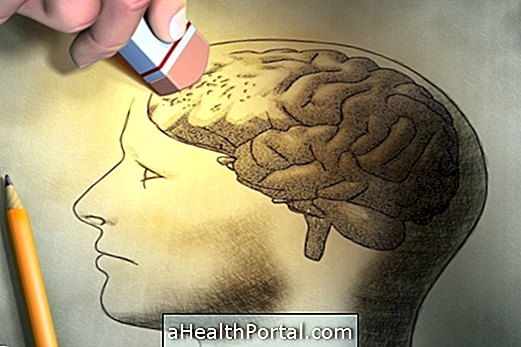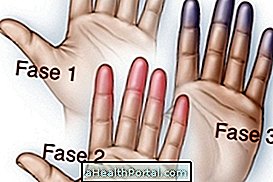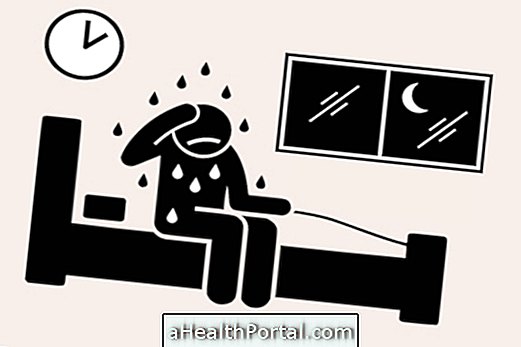The lack of memory or difficulty in memorizing information is rarely linked to diseases of the nervous system such as Alzheimer's, being a common problem also among young people and adults.
However, it is possible to improve the ability to fix information by using techniques that facilitate access to memory and increase the number of connections made by the brain, which facilitates learning and increases performance in studies and work.

So, here are 7 tips to change your routine and improve your memory.
1. Always learn something new
Always seeking to learn something new is to stimulate the brain to make new connections between neurons and to learn new ways of thinking and reasoning. The ideal is to engage in an activity that you do not master, to leave the comfort zone and bring new stimuli to the mind.
Starting a long process like learning to play an instrument or speaking a new language is a good way to stimulate the brain, as it is possible to start at easier levels that progress as the brain develops new skills.
2. Make notes
Taking notes while in class, meeting or lecture increases the capacity of our memory by helping to fix information in the mind.
When you hear something, writing and rereading automatically while writing increases the number of times the brain receives that information, facilitating learning and fixation.
3. Remember
Remembering is one of the most important tools to stimulate memory, as it activates the ability to teach yourself something new and to always be in touch with new information.
So, when reading or studying something you want to fix, close the notebook or take your eyes off the information and remember what was just read or heard. After a few hours, do the same, and repeat the process over the days, as you will soon realize that it becomes easier and easier to access the information in your mind.
Evaluate your memory right now with the following test:
- 1
- 2
- 3
- 4
- 5
- 6
- 7
- 8
- 9
- 10
- 11
- 12
- 13
Pay close attention!
You have 60 seconds to memorize the image on the next slide.
Start the test


60
Next15
Are there 5 people in the image?
- Yea
- No
15
Does the image have a blue circle?
- Yea
- No
15
Is the house in the yellow circle?
- Yea
- No
15
Are there three red crosses in the image?
- Yea
- No
15
Is the green circle for the hospital?
- Yea
- No
15
Does the man with the cane have a blue blouse?
- Yea
- No
15
Is the cane brown?
- Yea
- No
15
Does the hospital have 8 windows?
- Yea
- No
15
Does the house have a chimney?
- Yea
- No
15
Does the man in the wheelchair have a green shirt on?
- Yea
- No
15
Is the doctor with his arms crossed?
- Yea
- No
15
Are the suspenders of the man with the cane black?
- Yea
- No
4. Reread the information frequently
To learn something new more easily, it is necessary to reread the information frequently or to train again, in the case of physical or manual skills, such as learning to play an instrument or drawing.
This is because studying a new topic just on the eve of the test or accessing information only once makes the brain quickly interpret the information as irrelevant, quickly discarding it from long-term memory.
This discourages memory and decreases the ability to learn, as everything new enters and leaves the brain quickly.
5. Do physical activity
Frequent physical activity, especially aerobic exercise such as walking, swimming or running, increases brain oxygenation and prevents diseases that affect the health of the nervous system, such as diabetes and high blood pressure.
In addition, physical exercises decrease stress and increase the production of growth factors that stimulate the production of new connections between neurons, making access to memory faster and easier.
6. Sleep well
Most adults need at least 7 to 9 hours of sleep in order to rest properly and recover all the functions of the nervous system. Sleeping little causes a decrease in memory, creativity, critical capacity and the ability to solve problems.
It is during the deepest phases of sleep that toxic substances are eliminated from the brain and that long-term memory is fixed and consolidated, which makes small naps or frequently interrupted sleeps detrimental to having a good memory. See what happens to the body when we don't sleep well.
7. Have an active social life
Improving memory is not just about stimulating the mind with difficult activities, as relaxing and having an active social life decreases stress, stimulates learning and increases reasoning and reasoning skills.
So it is important to revisit friends, family, or have long phone conversations to keep your social life active. In addition, having a pet also helps to activate the brain.
Eating is also an important part of brain health, so see how to eat to improve memory by watching the video below.

To fix the learning, also read:
- Foods to Improve Memory
- Home remedy for memory
Was this information helpful?
Yes No
Your opinion is important! Write here how we can improve our text:
Any questions? Click here to be answered.
Email in which you want to receive a reply:
Check the confirmation email we sent you.
Your name:
Reason for visit:
--- Choose your reason --- DiseaseLive betterHelp another personGain knowledge
Are you a health professional?
NoMedicalPharmaceuticalsNurseNutritionistBiomedicalPhysiotherapistBeauticianOther





















